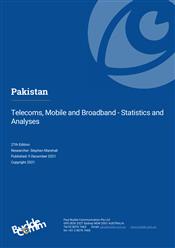Pakistan Telecoms Market Report
Telecoms, Mobile and Broadband - Statistics and Analyses

Publication Date: April 2024
Report Pages: 146
Analyst: Sebastien De Rosbo
Pakistan’s mobile segment provides a glimmer of hope for its telecom sector
Pakistan continues to lag most other Asian countries in terms of the maturity of its telecom sector. This is partly due to the poor state of its fixed-line network following years of under-investment and neglect by the state-owned incumbent telco Pakistan Telecommunication Company (PTC), with teledensity now down to almost 1%.
This lack of focus has left the door open to mobile to become the dominant platform for both voice and data. While penetration rates are low by Asian (and rest-of-world) standards, the mobile voice and mobile broadband markets have been growing at double-digit rates of late – at least in subscriber numbers. In contrast to the fixed network market, Pakistan’s mobile segment is highly competitive. The result has been continued downwards pressure to pricing and ARPU, such that mobile revenues have been unable to keep pace with the rate of market expansion as 4G LTE networks, in particular, stretch ever deeper into the more remote parts of the country.
Future growth (in market size as well as revenue) is likely to come from the wider availability of value-added services on top of the expansion of 4G LTE and (from 2023) 5G mobile networks. The Universal Service Fund (USF) continues to direct investment towards the development of mobile broadband (and, to a lesser extent, fibre-based networks) in under-served and even un-served areas of the country, with multiple projects being approved to start in 2021 and 2022.
This report update includes operator and regulator market data to September 2021, Telecom Maturity Index charts and analyses, an assessment of the global impact of Covid-19 on the telecoms sector, and other recent market developments.
Key Developments
- The Universal Service Fund (USF) Board approves a range of projects in the 2020/2021 budget to expand LTE into under-served areas.
- The Pakistan Telecommunication Authority (PTA) unveils a roadmap for launching 5G in 2023.
- Zong and Ufone each win unused spectrum in the 1800MHz band to expand 4G LTE services in the Azad Jammu & Kashmir and Gilgit Baltistan regions.
- VEON acquires the remaining 15% stake in Jazz from the Abu Dhabi Group for $273 million.
Key companies mentioned in this report:
Pakistan Telecommunication Company (PTC), Ufone, Telenor Pakistan, Jazz, Zong, Special Communications Organisation (SCO).
Related Reports
- 2019 Asia - Mobile Network Operators and MVNOs
- 2019 Asia - Fixed Broadband Market - Statistics and Analyses
- 2019 Asia - Mobile Infrastructure and Mobile Broadband
- Kazakhstan - Telecoms, Mobile and Broadband - Statistics and Analyses
- Vietnam - Telecoms, Mobile and Broadband - Statistics and Analyses
- Tajikistan - Telecoms, Mobile and Broadband - Statistics and Analyses
- Brunei Darussalam - Telecoms, Mobile and Broadband - Statistics and Analyses
- Maldives - Telecoms, Mobile and Broadband - Statistics and Analyses
- Sri Lanka - Telecoms, Mobile and Broadband - Statistics and Analyses
- Mongolia - Telecoms, Mobile and Broadband - Statistics and Analyses
Share this Report
TMT Intelligence
A platform to scale your intelligence tasks
Monitor critical insights with our AI-powered Market Intelligence Platform gathering and analyzing intelligence in real time. With AI trained to spot emerging trends and detect new strategic opportunities, our clients use TMT Intelligence to accelerate their growth.
If you want to know more about it, please see:
Research Methodology
BuddeComm's strategic business reports contain a combination of both primary and secondary research statistics, analyses written by our senior analysts supported by a network of experts, industry contacts and researchers from around the world as well as our own scenario forecasts.
For more details, please see:
More than 4,000 customers from 140 countries utilise BuddeComm Research
Are you interested in BuddeComm's Custom Research Service?
Hot Topics
News & Views
Have the latest telecommunications industry news delivered to your inbox by subscribing to BuddeComm's weekly newsletter.